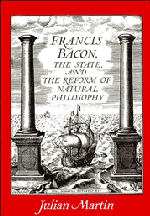Summary
Why may not that be the skull of a lawyer? Where be his quiddities now, his quillities, his cases, his Tenures, and his tricks?
Shakespeare, Hamlet, V, i, 98–100If historians are to understand what it was that Bacon thought he was doing in writing about natural philosophy, we must accept that he always regarded himself as a statesman and a personal councillor to kings, rather than as a private person. By examining his upbringing and his legal career as an elite Crown servant, we have been able to see that his reform of natural philosophy, no less than his proposed reform of law, was always governed by his political perspective and his loyal ambition to create bureaucratic machinery with which his master could better govern and expand his kingdom. Bacon was convinced that the enhancement of the powers of the Crown was a great and necessary good and, as his loathing for men like Edward Coke illustrates, he viewed any attempts to detract from these powers as seditious. Similarly, in Scriptural matters, men should accept the leadership of official experts, namely, the ecclesiastical hierarchy; those who assumed a right to pronounce independently about religious truths were ‘sectaries’. So, too, in natural philosophy: men should accept the leadership of official experts and a centralised organisation. Those who assumed otherwise were ‘willful’ and ‘voluntaries’. No wonder that his physician, William Harvey, a celebrated voluntary (as it were), could say that Bacon wrote philosophy ‘like a Lord Chancellor’.
- Type
- Chapter
- Information
- Francis Bacon, the State and the Reform of Natural Philosophy , pp. 172 - 175Publisher: Cambridge University PressPrint publication year: 1991
- 1
- Cited by



